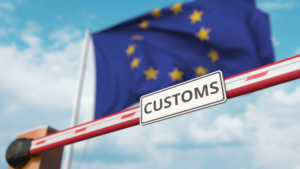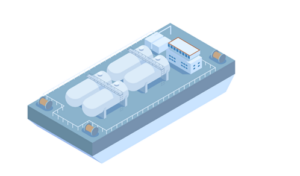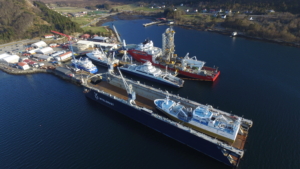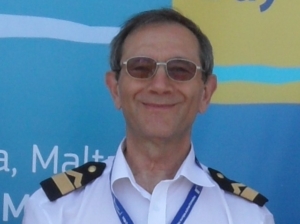Daniel Garden, CEO, Blue Maritime Cluster: The cluster companies total revenues are estimated to 58 bn NOK in 2023
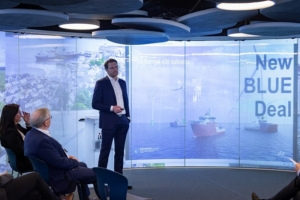
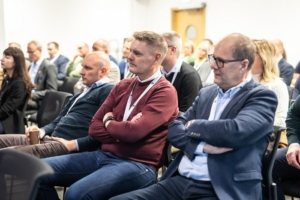
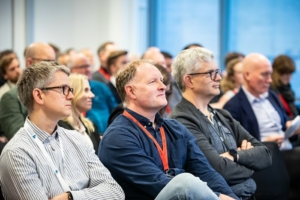
5 questions to Daniel Garden, CEO, Blue Maritime Cluster.
An exclusive interview to Baltic Journalist Maritime Club of the Baltic Sea & Space Cluster (BSSC)
By: Marek Grzybowski (BSSC)
The Blue Maritime cluster is a National maritime cluster mandated by the Royal Ministry of Trade, Industry and Fisheries to accelerate innovation within the maritime supply chain. The cluster companies total revenues are estimated to 58 bn NOK in 2023 against 54 bn in 2022. Our export share is 50% on average divided between yards (NOK 2.5 bn), shipping companies (3.3 bn), services (6.7 bn) and equipment suppliers (11.1 bn).
New Blue Deal, launched in june 2021, where we take aim on becoming the first zero emission maritime cluster in the world. Many initiatives around the world are looking at new green alternative fuels and energy to run the ships of tomorrow. We look at the energy sources. Yes they must be low and zero emission. How do we produce them, harvest them and how do we establish an infrastructure for them? Furthermore we look at the energy consumption in the vessels. Not only engines and generators, but the complete consumption of energy that goes into a ship. Where can we save?
Through our work in R&D and competence elevation, we are determined to develop a complete green newbuilding program, a green refit program and a circular value chain for decommissioning – all based on the New Blue Deal directions.
Marek Grzybowski: Please, describe the fields in which the Cluster operates? In which region of Norway are the companies operating in the cluster concentrated?
Daniel Garden, CEO, Blue Maritime Cluster:
The Blue Maritime cluster is a National maritime cluster mandated by the Royal Ministry of Trade, Industry and Fisheries to accelerate innovation within the maritime supply chain. We facilitate R&D projects, pre-studies, competence project and analysis activities in order to provide the participants with market intelligence and knowledge within commerce, technology or methodology. The geografical concentration of this industry is highest in the region between Trondheim and Bergen on the west coast.
Marek Grzybowski: In 2014, due its unique global market position and its important contribution to Norwegian value creation, the cluster was granted the status of a Global Centre of Expertise. What role does Blue Maritime Cluster play in the green transition?
Daniel Garden, CEO, Blue Maritime Cluster:
I would start with mentioning the even more important cluster strategy, New Blue Deal, launched in june 2021, where we take aim on becoming the first zero emission maritime cluster in the world. Many initiatives around the world are looking at new green alternative fuels and energy to run the ships of tomorrow. To us, the ships of tomorrow must also require far less energy to operate in order to accommodate reduced energy concentration or other scarcities accompanied with alternative energy sources. Looking at both these topics simultaneously, we believe we can arrive at the goal faster. Combining this work with the unique position and skills our cluster has within maritime innovation, we believe we will succeed.
Marek Grzybowski: What does the cluster build its competitive advantage on? What tasks related to raising the level of innovation does the cluster focus on? What technologies, solutions and businesses of the future are being developed. What projects are implemented by the cluster?
Daniel Garden, CEO, Blue Maritime Cluster:
We base our projects and competence development around the idea of the full supply chain is constantly challenging the established methods and technologies. By being the first with the latest solutions, we can compete against larger and/or cheaper regions of the world. I believe the entire European cluster would benefit from chasing such a position, actually.
As the whole maritime community of companies, research and universities, risk capital, public bodies and entrepreneurs are all represented in the cluster, we are also able to address the challenges, like zero emission. Our strategy on zero emission starts with the ship operations and looking at how they can become more efficient. The least polluting miles are the ones you never sail.
Then we look at the energy sources. Yes they must be low and zero emission. How do we produce them, harvest them and how do we establish an infrastructure for them? Furthermore we look at the energy consumption in the vessels. Not only engines and generators, but the complete consumption of energy that goes into a ship. Where can we save?
Moving on to smart use of energy, we look at how to develop methods and technologies that will let us use the energy over and over again. It can be heat recovery, regeneration on winches and more.
In an extended view, we will not succeed in net zero before we also look at the building and scrapping processes of the vessels. How can we build emission free? What new supply chains must be established? It is all very exciting work, I must admit.
Marek Grzybowski: The Steering Committee operates in the Cluster. What is its mission, what are its tasks, what is its role in creating development directions, projects and business activities? What are the most important directions for the development of the maritime business for the Møre maritime cluster?
Daniel Garden, CEO, Blue Maritime Cluster:
The Steering Committee is our board that oversees the cluster’s administration and strategic progress. Our development directions are formed on the basis of our strategy where the companies themselves initiate the topics on which to focus on. Our activity is dependent on the companies involving themselves in the projects, spending their time and money on them. So to reach a high level of committment we also need the projects to be relevant to the participants.
Through our work in R&D and competence elevation, we are determined to develop a complete green newbuilding program, a green refit program and a circular value chain for decommissioning – all based on the New Blue Deal directions.
Commercially, the Norwegian market is too small for us, and as export always has been an important part of the cluster’s revenues, developing the export is also an important foundation for our work.
Marek Grzybowski: The high level of the offer of innovative technologies results in a high level of revenues of companies operating in the Cluster in the Møre region. What is the overall revenue for the four main segments in Møre region in 2020-2022? What are the prospects for 2023? What is the share of export revenues? What is the future export potential for the maritime companies in the Møre region? What are Cluster export opportunities and barriers?
Daniel Garden, CEO, Blue Maritime Cluster:
The cluster companies total revenues are estimated to 58 bn NOK in 2023 against 54 bn in 2022. Our export share is 50% on average divided between yards (NOK 2.5 bn), shipping companies (3.3 bn), services (6.7 bn) and equipment suppliers (11.1 bn).
The governent has an ambition for 50% increase of export by 2030. Our cluster will be well prepared to take our share from the segments within ocean based energy, ocean based food and ocean based travel.
Marek Grzybowski: Thank you for your answers
